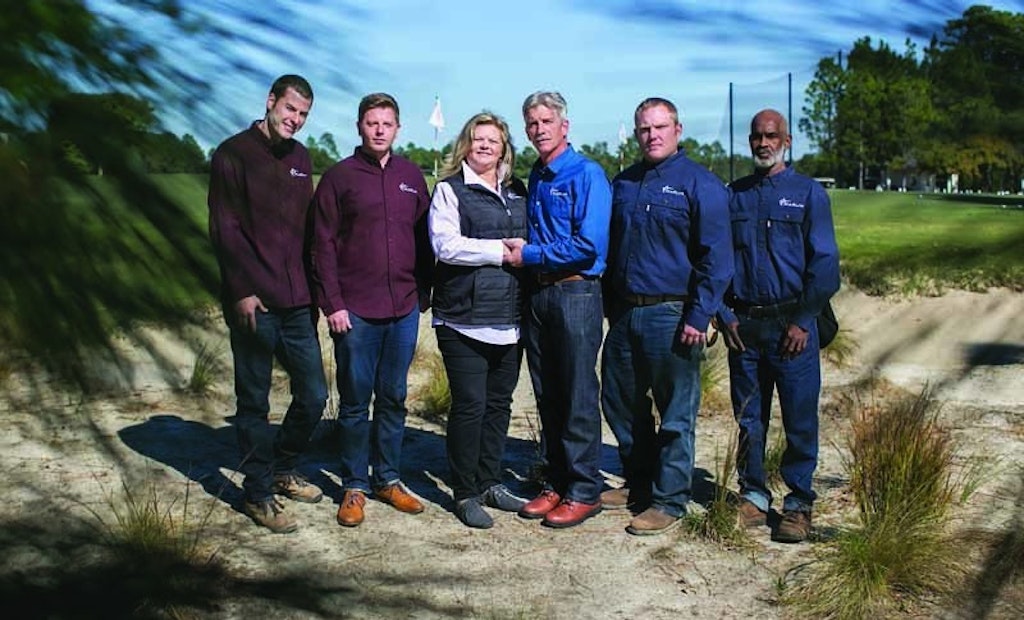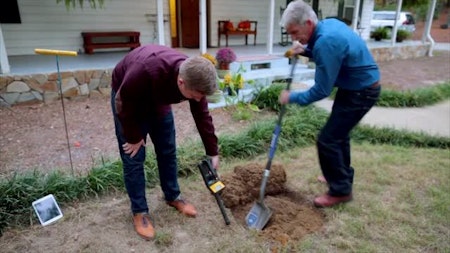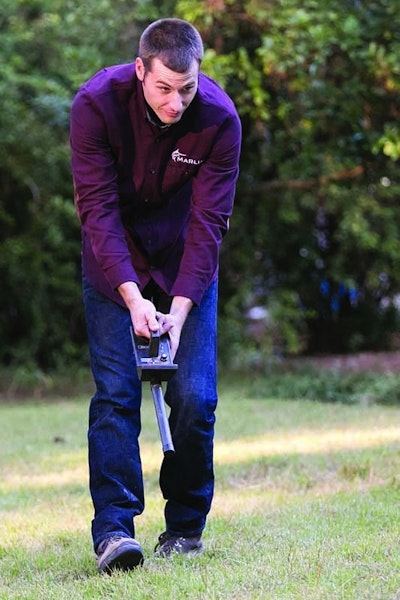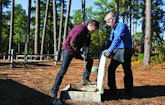
Interested in Trucks?
Get Trucks articles, news and videos right in your inbox! Sign up now.
Trucks + Get AlertsAn extreme makeover at Marlin Wastewater Services has resulted in dramatically streamlined operations and increased growth for the West End, North Carolina-based company.
When Jeffrey Kerr, the son of company owners Jeff and Christine Kerr, came on board in 2015, the trio methodically took steps to modernize the business. The changes affect almost every facet of the company, from its branding, marketing practices and database management, to how it schedules jobs and bills to the range of payment options it offers customers. Along the way, Jeffrey, who handles business development and marketing, and his father are also striving to change consumers’ perceptions of the septic industry by putting even greater emphasis on professionalism and customer education.
“Jeffrey is changing the face of Marlin Wastewater,” says the elder Kerr, who bought the company from his parents, Marlin and Dorothy, who founded the company in northwestern Michigan back in 1968. “Without the technology he’s been adding, it would’ve been impossible to grow the business the way we have. Because of what he’s done, I have more time during the day to focus on training employees.
“I’m not sorting through files anymore because we do everything with a cellphone and an iPad,” he adds. “We’ve greatly reduced the amount of paperwork required.”
Jeff fully embraces his son’s efforts. “I’ve dreamed for years about using technology to make our jobs easier,’’ he says. “The technology has been around for 15 years or more – it just required a lot of work (to implement it). Jeffrey almost has us completely paperless now. Everything he’s doing has resulted in drastic improvements.”
Marlin Wastewater is a family operation in every sense of the word. For years, Jeff and Christine worked as a close-knit team. Then Jeffrey came on board, followed by the addition of his brother-in-law, Brad Redden, who serves as a field service manager.
“My mom and dad built the business together,” Jeffrey says. “Mom managed the whole business while Dad was out in the field. She did everything – she was the only one in the office for years. She’s truly the reason why the business is where it is today.”
Currently, about 50 percent of the company’s revenue comes from septic system inspections and repairs and roughly 25 percent from residential septic tank pumping. Grease trap cleaning generates the balance, Jeff says.
TIME FOR A CHANGE
Jeffrey, who was a musician for many years and also worked in the e-commerce field with a focus on digital strategy and marketing, initially joined Marlin to streamline the company’s operations. “But I saw nothing but a business with extraordinary potential,” he says.
Today the company boasts a professional-looking website that Jeffrey designed; it has greatly enhanced the company’s marketing efforts and makes doing business easier for customers. In addition, the business uses cloud-based field service management and accounting software developed by Xero Limited. It also relies on Stripe, Square and Memberful software (developed by Stripe, Square Inc. and Jestro LLC) for in-the-field and online payment processing – a customer convenience that burnishes the company’s reputation as a modern, progressive outfit, Jeffrey says.
The business also enhances customer service by giving clients the capability to schedule appointments via the website; they receive an email reminder of the appointment a day before it’s scheduled. “Some people are scheduling appointments three to five years ahead of time, depending on how often their tank needs to be pumped,” Jeffrey says. “In the old days, all that was done on paper and it was very time-consuming to manage.”
While the technological advancements improve operating efficiencies, the younger Kerr points out they increase customer satisfaction, too.
“Business owners often see technology as a headache,” he says. “But using new tools like these can completely change the way customers view a business. For example, customers love the ability to pay however they like, whether it’s with PayPal or American Express or even bitcoins. If there’s a payment process out there, we can use it. We can even help customers get financing for the work we do.”
APPEARANCE UPGRADES
The newest addition to the company’s fleet of equipment – a vacuum truck built out by Lely Tank & Waste Solutions on a 2013 International chassis – also reflects the company’s emphasis on modernizing operations. It features a 2,500-gallon steel tank built by Abernethy Welding & Repair and a pump manufactured by National Vacuum Equipment.
The truck’s appearance, not its basic components, reflect a sharp shift in marketing emphasis. “We’re investing a little more in appearance than we have in the past by wrapping the cab with a vinyl wrap and painting the tank,” Jeff notes. “Before this, our focus was not so much on appearance, but on something that’ll work and do the job. We mirrored the industry in those days.”
To serve customers, the company also relies on a second vacuum truck built by Abernethy on a 2002 Freightliner chassis with a 2,500-gallon steel tank and a National Vacuum Equipment pump. The company also owns a Terralift soil-restoration machine; tank-locating equipment made by Prototek; two 4,000 psi water jetters and a pipeline inspection camera system from Spartan Tool; and Case and Kubota backhoe/front-end loaders.
CONSUMER EDUCATION
Jeff strongly believes providing top-shelf customer service is the best way for pumpers to differentiate themselves from competitors. “We strive to make service paramount – do the job right so we don’t have to go back,” he says. One primary benefit of great service: the ability to charge higher prices. “We’re significantly higher than some of our competitors,” he says.
But customers are willing to pay more for attention to detail, such as TLC treatment Marlin gives to customers’ yards. When digging up tank lids, for example, technicians cut off the sod, roll it up and put it aside. And they place any soil they dig up on a plastic tarp, which eliminates the need to rake up dirt and possibly damage a lawn afterward.
“We know that the majority of our work comes from word-of-mouth referrals. … Customers’ neighbors notice that we don’t leave any mess behind,” he says. “We envision our customers as our mother or a sister and work accordingly. Plus we save about an hour of work a day by investing in a $3 tarp.”
Marlin technicians also are trained to take as much time as necessary on each job and to thoroughly educate customers about their septic systems. “When I was a kid, my dad always said we’re looking for long-term customers, not a paycheck,” Jeff explains. “Employees are trained to take all the time required to make customers understand septic system operation and what to expect from us.”
A CAPABLE WORKFORCE
Accomplishing that requires hiring high-caliber employees, and the company wants employees willing to do things the Marlin way. “Most of our employees tell me they’ve never had a boss that told them to slow down,” Jeff says. “But we never want employees to hurry while working for a customer – or while driving.”
To attract and retain quality employees, Marlin now offers higher pay than it has in the past. The company also offers other benefits such as health insurance (with premiums fully paid by the company after one year on the job), vacation time, direct payroll deposit and payment of cellphone fees.
“But we have a high level of expectations,” Jeff points out. “We’re leaving our business in their hands. Aside from me, the technicians are the only people in our company that customers interact with. So we want a better, more educated workforce. We want to attract people who are motivated to grow with us and feel confident that we will invest in them.”
Jeffrey says the company wants employees to act as if they own their own small franchise within the company – trust them to make decisions in the field, and do better financially as the company does better financially. “They can make an amazing living pumping septic tanks,” he says. “They’re ambassadors of our brand. … They wear uniforms and are well-spoken and kind to customers. It’s incredible what kind of impression that makes.”
GROWTH THROUGH DIVERSIFICATION
Going forward, the Kerrs are considering getting back into septic system installations, a service they abandoned years ago when the market became saturated with installers. The move would allow the company to capture new revenue and build stronger long-term relationships with customers.
But whatever new directions the company takes, it will continue to emphasize professionalism, thorough technician training and customer education. A key, Jeffrey says, is that the business keeps doing whatever it can to help consumers perceive the wastewater industry favorably – see pumpers more as environmental stewards, not as just guys who pump out a tank, get paid and leave.
“If you can relate good septic practices to clean water … keeping a local lake clean enough to swim in, it gives people another good reason to keep their septic systems well maintained,” he says.
Growing demand for inspections
Pumpers on the lookout for additional revenue streams may take a cue from Marlin Wastewater Services, which capitalizes on a niche market that’s dependable, profitable and helps develop future business opportunities: septic system inspections.
System inspections aren’t mandatory in Marlin’s home state of North Carolina. “But more and more lending institutions are asking for them (in order to obtain home loans) and as we educate customers, more and more people want them,” says Jeffrey Kerr, the son of owners Jeff and Christine Kerr. A state license is required to perform inspections; to earn one, pumpers must attend classes, pass a test and compile a certain number of hours of experience, then take annual continuing education courses. “It’s a profitable business segment, but it requires a lot of knowledge and experience and carries some risks, too,” says Jeffrey, who handles marketing and business development for the company. “You’re expected to be objective and explain and outline the entire system … to everyone involved in the home-sale transaction (attorneys, sellers, buyers, etc.).”
To generate referrals, Jeffrey puts on seminars for area real estate agents so they better understand how inspections work and why they’re beneficial. “We do what we can to let them know we’re a resource,” he notes. “By creating relationships with the real estate community, we build trust.
“We usually see homeowners only once every three to five years, but we talk to Realtors several times a week,” he continues. “We want them to understand the benefits of doing inspections and do everything we can to make it easy for them to recommend us to their clients.”
An added benefit: Performing inspections for homeowners-to-be provides an entree to future services, such as repairs or pumping, he points out.











